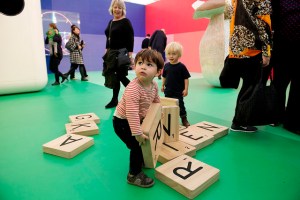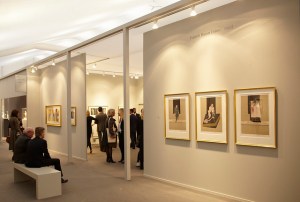Wednesday, 15 October: Frieze
Monday | Tuesday | Wednesday | Thursday | Friday | Saturday
‘But it’s so BIG!’ I heard an angry American journalist exclaim. And she spoke the truth – Frieze is big. For those readers who have never had the opportunity or indeed the stamina to visit, picture this: a normal art fair with two others plonked down on either side, with another landed a bus ride away. Or, in normal parlance, two Emirates stadiums plus Highbury, plus hotdog stands magically transformed into gourmet pizza outlets. You get the picture.
When you walk in it takes 20 minutes to adjust. People race by like meteorites, and you have an uneasy sense that they are not so much individuals as atoms of a crowd. You can’t stop and look at anything. You have to keep moving, lest one of these asteroids score a direct hit. Then, gradually, you become part of the crowd, too. People become people again. Sometimes you recognise the odd one, struggling to acclimatise.
But what about the art? How does Frieze 14 – the fair’s 12th edition – actually square up? How does it command its infamy, its buzz, its singular place in the arts calendar?

Frieze London 2014: Gagosian Gallery. Photograph by Linda Nylind. Courtesy of Linda Nylind/Frieze.
I’ll tell you. There’s the fun (Carsten Holler’s installation, a Day-Glo playground called Kindergarten), the good (Spruth Magers’s stand is particularly strong), the bad (I would but, oh, what’s the point) and the OK. There is a lot of OK, stuff you wouldn’t mind if you saw in isolation. OK is OK, and most art is. But you can have too much of it: and when it’s under lights like these, too much really is too much.
I spent five hours in Frieze, and was I glad to get out. But I didn’t dislike it. Frieze is necessary – it gives the London art circuit a certain buzz, and what’s more it really is exciting, one of the honest-to-god strangest and most fascinating people-watching opportunities there is. It has an atmosphere quite unlike anything else.

Frieze Masters 2014. Photograph by Stephen Wells. Courtesy of Stephen Wells/Frieze
Frieze Masters, then, was like a decompression chamber. The stands, catering to a different kind of customer, are spaced further apart, painted in a tasteful shade of Farrow and Ball grey. People walk at a slower pace. It’s an altogether less frantic experience, best negotiated with a glass of complementary champagne. Looking at the Leon Kossoff’s ‘drawing paintings’ at Annely Juda and Mitchell-Innes and Nash’s collaborative stall, or an enormous 18th-century map of London at Daniel Crouch’s space was like getting into a bath after a long day on the tundra.
Visiting Frieze’s Regent’s Park colony is like travelling to another planet, a notion reinforced by the difficulty of leaving the place. I foolishly chose to get a shuttle bus back to the Marylebone Road from the Frieze Masters site. It took me three times as long as it would have done on foot – and when finally my feet touched the pavement, it felt like a lucky escape. I ran to the tube, scared witless that I’d be pulled back into orbit.
Monday | Tuesday | Wednesday | Thursday | Friday | Saturday
More from Digby Warde-Aldam
Related Articles
Frieze Masters: October Apollo (James Cahill)
Keep track of the major Frieze week exhibition openings with our daily London Diary.

Frieze Week: Digby’s Diary (Wednesday)
Frieze London 2014: Hauser & Wirth. Photograph by Linda Nylind. Courtesy of Linda Nylind/Frieze
Share
Wednesday, 15 October: Frieze
Monday | Tuesday | Wednesday | Thursday | Friday | Saturday
‘But it’s so BIG!’ I heard an angry American journalist exclaim. And she spoke the truth – Frieze is big. For those readers who have never had the opportunity or indeed the stamina to visit, picture this: a normal art fair with two others plonked down on either side, with another landed a bus ride away. Or, in normal parlance, two Emirates stadiums plus Highbury, plus hotdog stands magically transformed into gourmet pizza outlets. You get the picture.
When you walk in it takes 20 minutes to adjust. People race by like meteorites, and you have an uneasy sense that they are not so much individuals as atoms of a crowd. You can’t stop and look at anything. You have to keep moving, lest one of these asteroids score a direct hit. Then, gradually, you become part of the crowd, too. People become people again. Sometimes you recognise the odd one, struggling to acclimatise.
But what about the art? How does Frieze 14 – the fair’s 12th edition – actually square up? How does it command its infamy, its buzz, its singular place in the arts calendar?
Frieze London 2014: Gagosian Gallery. Photograph by Linda Nylind. Courtesy of Linda Nylind/Frieze.
I’ll tell you. There’s the fun (Carsten Holler’s installation, a Day-Glo playground called Kindergarten), the good (Spruth Magers’s stand is particularly strong), the bad (I would but, oh, what’s the point) and the OK. There is a lot of OK, stuff you wouldn’t mind if you saw in isolation. OK is OK, and most art is. But you can have too much of it: and when it’s under lights like these, too much really is too much.
I spent five hours in Frieze, and was I glad to get out. But I didn’t dislike it. Frieze is necessary – it gives the London art circuit a certain buzz, and what’s more it really is exciting, one of the honest-to-god strangest and most fascinating people-watching opportunities there is. It has an atmosphere quite unlike anything else.
Frieze Masters 2014. Photograph by Stephen Wells. Courtesy of Stephen Wells/Frieze
Frieze Masters, then, was like a decompression chamber. The stands, catering to a different kind of customer, are spaced further apart, painted in a tasteful shade of Farrow and Ball grey. People walk at a slower pace. It’s an altogether less frantic experience, best negotiated with a glass of complementary champagne. Looking at the Leon Kossoff’s ‘drawing paintings’ at Annely Juda and Mitchell-Innes and Nash’s collaborative stall, or an enormous 18th-century map of London at Daniel Crouch’s space was like getting into a bath after a long day on the tundra.
Visiting Frieze’s Regent’s Park colony is like travelling to another planet, a notion reinforced by the difficulty of leaving the place. I foolishly chose to get a shuttle bus back to the Marylebone Road from the Frieze Masters site. It took me three times as long as it would have done on foot – and when finally my feet touched the pavement, it felt like a lucky escape. I ran to the tube, scared witless that I’d be pulled back into orbit.
Monday | Tuesday | Wednesday | Thursday | Friday | Saturday
More from Digby Warde-Aldam
Related Articles
Frieze Masters: October Apollo (James Cahill)
Keep track of the major Frieze week exhibition openings with our daily London Diary.
Share
Recommended for you
Outside the tents: Frieze Sculpture Park
One source of respite from the surrounding art fair frenzy is the Frieze Sculpture Park
First Look: ‘Egon Schiele – Jenny Saville’ at the Kunsthaus Zürich
Curator Oliver Wick discusses staging an encounter between Schiele and Saville
Review: Sculptors’ Papers at the Whitechapel Gallery
A new exhibition illuminates the stories behind some of London’s most radical public sculptures